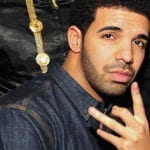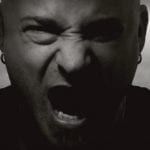 Weird Stuff
Weird Stuff  Weird Stuff
Weird Stuff  Mysteries
Mysteries 10 Tragic Disappearances and Deaths in Joshua Tree National Park
 History
History 10 Ways Childhood Really Sucked in the Old West
 Music
Music 10 Name Origins of Famous Bands from the 1990s
 Religion
Religion 10 Biggest Turnarounds by the Catholic Church
 Weird Stuff
Weird Stuff 10 Unbelievable Times Laws Had Unintended Consequences
 Humans
Humans Ten Historic Women Who Deserve Way More Credit Than They Got
 Movies and TV
Movies and TV 10 Films That Spawned Major Lawsuits
 History
History Ten Times Towns Were Wiped Off the Face of the Earth
 Creepy
Creepy 10 of the Most Disturbingly Haunted Public Houses in the UK
 Weird Stuff
Weird Stuff 10 Niche Subcultures That Are More Popular Than You Might Think
 Mysteries
Mysteries 10 Tragic Disappearances and Deaths in Joshua Tree National Park
 History
History 10 Ways Childhood Really Sucked in the Old West
Who's Behind Listverse?

Jamie Frater
Head Editor
Jamie founded Listverse due to an insatiable desire to share fascinating, obscure, and bizarre facts. He has been a guest speaker on numerous national radio and television stations and is a five time published author.
More About Us Music
Music 10 Name Origins of Famous Bands from the 1990s
 Religion
Religion 10 Biggest Turnarounds by the Catholic Church
 Weird Stuff
Weird Stuff 10 Unbelievable Times Laws Had Unintended Consequences
 Humans
Humans Ten Historic Women Who Deserve Way More Credit Than They Got
 Movies and TV
Movies and TV 10 Films That Spawned Major Lawsuits
 History
History Ten Times Towns Were Wiped Off the Face of the Earth
 Creepy
Creepy 10 of the Most Disturbingly Haunted Public Houses in the UK
Top 10 Secrets Of The Original ‘Ghostbusters’ Movie
From the moment it hit movie screens, Ghostbusters was destined to be an instant classic. It’s at the top of childhood favorite lists and helped to define a generation.
It also marked the beginning of big budget comedy films and proved, perhaps for the last time, that Saturday Night Live alumni could make the leap to a successful movie franchise. (We kid. The Ladies Man was awesome.)
Like most cultural phenomena, the impact of Ghostbusters was a surprise to those involved in making the movie. In fact, the film almost didn’t happen. Here are 10 other surprising facts from one of the 1980s’ best movies.
10 Shocking Secrets Of Stephen King’s Original IT Movie
10 Hell On Wheels
The Ectomobile (aka the Ecto-1) is an iconic car that’s right up there with the black Pontiac in Knight Rider and the DeLorean in Back to the Future. A vehicle like this can set the entire tone for a scene and spin off a fortune in merchandising. But the Ecto-1 wasn’t always what you see on-screen. In fact, it almost wasn’t anything.
Originally, the car driven by the gang was supposed to be a pink Cadillac ambulance. After the crew (thankfully) scrapped that idea, they decided to paint the whole thing black. Stephen Dane came in and saved the day by designing the over-the-top, lights-flashing, sirens-blaring response vehicle we all know now.[1]
Though it may have looked fierce on-screen, the all-black Ecto was almost impossible to film in the night scenes according to cinematographer Laszlo Kovacs. Despite all this, fans are lucky that they saw any footage of the Ectomobile. As Dan Aykroyd revealed, the thing was a piece of junk. They could barely keep it running between takes, and it broke down constantly on set.
9 Who’s On First?
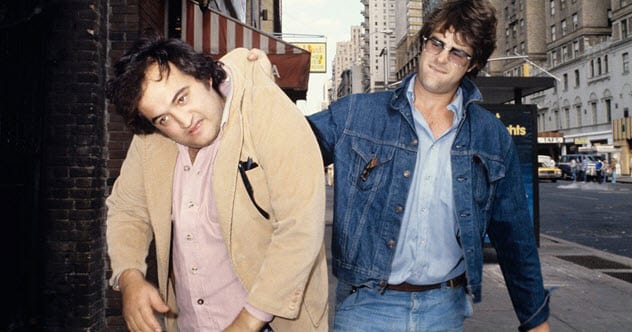
All movies go through casting changes. However, with an unproven franchise just getting started, changes happened left and right on the Ghostbusters set. According to some sources, Dan Aykroyd initially wrote the movie for John Belushi, Eddie Murphy, and himself as the original Ghostbusters. Unfortunately, Belushi died of a drug overdose and Murphy was already committed to Beverly Hills Cop.
John Candy was supposed to play Louis Tully (Rick Moranis’s character). But Candy wanted to portray the character with a German accent and a pair of Schnauzers as companions. The writers balked, and Candy moved on.
Ernie Hudson took the role of Winston Zeddemore, the fourth Ghostbuster. His part was reduced in rewrites from an original Ghostbusters team member to someone who is hired from an ad later in the film.
Through some creative negotiating, Frank Price of Columbia Pictures convinced SNL alum Bill Murray to take the role of Ghostbuster Peter Venkman, and, well . . . the rest is history.[2]
8 Special Cameo
One of the most popular characters in the first Ghostbusters movie didn’t even have a name. On set, he was known as “Onion Head Ghost” because of his terrible smell, but the name never stuck.
The floating ball of green slime that wreaked havoc in the Manhattan hotel scene and scarfed down everything in sight was affectionately known as “Slimer” to fans. But writers Dan Aykroyd and Harold Ramis thought of Slimer as the ghost of John Belushi. They wanted the green goblin to resemble Belushi as a sort of tribute to their deceased friend, a man who meant so much to so many and just missed being part of something very special.[3]
7 Stick To The Script
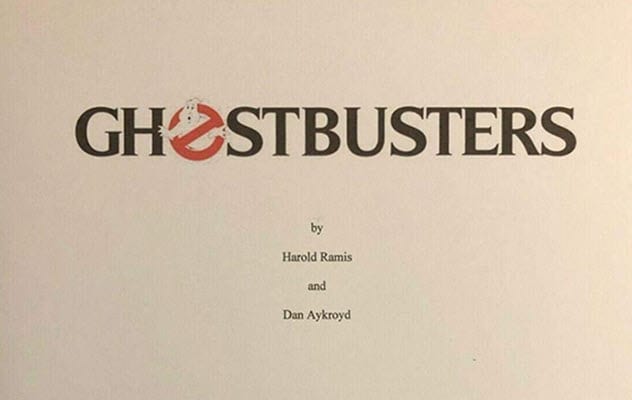
Everyone in the cast was familiar with Saturday Night Live and improv by the time Ghostbusters started filming. Many of the stars were former cast members, so it should come as no surprise that many lines were ad-libbed when it came time to shoot.
According to the cast, almost every scene had at least one line that wasn’t in the script. The actors were constantly putting their own spin on the characters they portrayed.
That might be one reason why the movie feels so honest and real. Murray said that he decided to act exactly how he would if he found himself in the same situation, providing a transparent view of the iconic actor in a parallel ghost-busting universe.[4]
6 What’s In A Name?
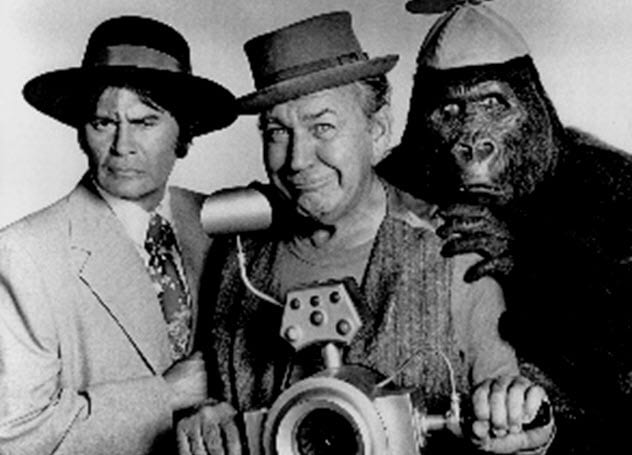
Ghostbusters is one of those instantly recognizable, perfect names. It gets to the point, it drives the message home, and . . . it almost wasn’t what they called the movie at all.
Dan Aykroyd was the driving force behind Ghostbusters in the early days and came up with the concept. He was inspired by a number of personal events, including his family’s history in law enforcement. He knew what he wanted the movie to be named. Unfortunately, a TV show with the same name had previously aired, forcing a legal battle over rights.[5]
After waffling between awful alternatives like Ghost Smashers, the studio was able to work out a deal on the movie title, with the original company securing usage rights. But the uncertainty did lead to something even more iconic . . .
Top 10 Secrets Of Iconic Hollywood Sounds
5 No Ghosts Allowed
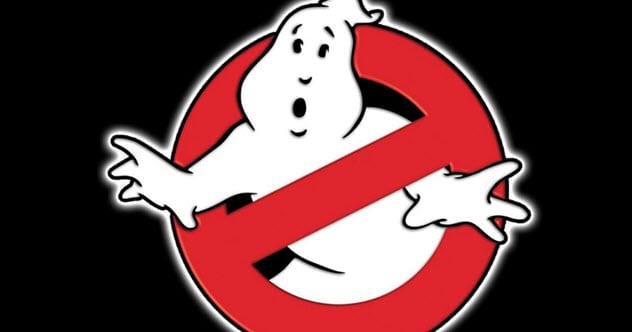
During the movie title debacle that tied up naming rights for a large part of the production, the team still needed a logo for early promotion. So they created a logo that expressed in no uncertain terms the feel of the movie without the presence of a title.[6]
That’s how the world got “Mooglie,” the cartoon ghost that we’ve all seen trapped in the red line and circle (the universal “no” symbol, as in “no ghosts”) on lunchboxes, billboards, posters, and more. Once naming rights were settled, the official Ghostbusters title was added under the logo (with the logo also replacing the letter “o” in “Ghostbusters”), thus creating the iconic poster we’ve all seen ever since.
4 Work For It
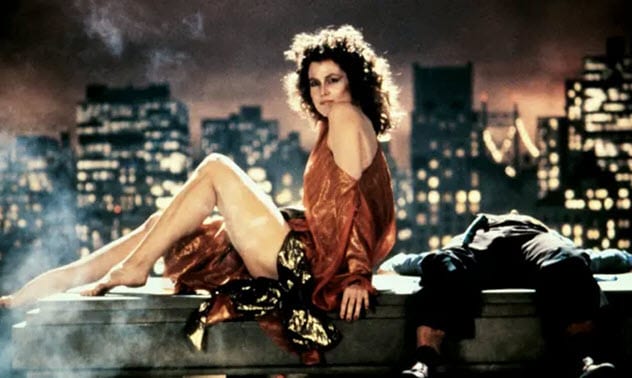
Some actors will go all out to prove they’re the right choice for the role. Fresh off the success of Alien, Sigourney Weaver wanted to make it clear during her audition that she could play any part to perfection.
When she showed up for the reading, Weaver told producers that Dana’s character should turn into a dog and that she could play that role better than anyone. She started barking, gnawing on the cushions, and terrorizing the room.[7]
Reitman cut the film and told Weaver to “[never] do that again.” But he also called Harold Ramis (Egon) immediately and told him they’d found their actress. Sadly, that scene was never shot. But clearly, Weaver was ready for anything you could throw at her.
3 Not Strictly Legal
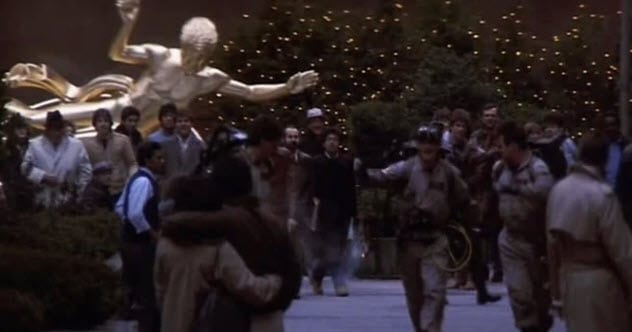
One big surprise to Ghostbusters fans is that much of the movie wasn’t shot in Manhattan. For a film that so perfectly grasps the feel and mood of New York in the 1980s, relatively few shots were done within the city limits.
Schedules and New York City crowd control made it almost impossible when Los Angeles was already perfectly set up to handle that sort of thing. Another problem was shooting permits, which proved difficult to get in New York City.
The team decided to go rogue and shoot as much as possible there while they could. This landed them in hot water with New York local law enforcement, especially where the montage scene was filmed on Day One. In one scene, someone who looks like a security guard is chasing the cast while Dan drives the Ecto-1.[8]
2 Sometimes It Just Works
The theme song for Ghostbusters is by far one of the most easily recognizable songs in the history of cinema. Three notes in and most fans are already swaying along.
Surprisingly, the song—written and performed by Ray Parker Jr.—was actually done in just two days. It was an instant classic that came off in record time.
Unfortunately, that wasn’t the end of the deal. Huey Lewis, who was originally hired to write the theme song, sued over infringement claims involving his hit “I Want a New Drug.” The case was settled out of court. So now, we still have the funky ’80s classic to remind us “who you gonna call.”[9]
1 Who You Gonna Call?
It’s a running gag in movies that phone numbers are almost always fakes. The standard “555” area code leads nowhere to protect innocent people from getting hounded on their phone lines. An example is the unfortunate list of people who could be reached at 867-5309, the number repeated many times in the lyrics of Tommy Tutone’s 1980s hit song “867-5309/Jenny.”
Ghostbusters, however, was different. In a fake TV spot in the movie, the team states emphatically: “We’re ready to believe you.” The 555 number that flashed on-screen was live at the time. While it was up, the 1-800-555-2368 line received around 1,000 calls per hour and played a recorded message from Peter Venkman (Bill Murray) and Raymond Stantz (Dan Aykroyd).[10]
+ The Mandela Effect
An additional tidbit in Ghostbusters lore involves a curious Mandela effect in the original script. One scene didn’t quite fit in the movie and left a lot of viewers (especially younger ones) a little confused. (You can see it in the video montage above at the 2:48 mark.)
Most fans remember seeing Aykroyd’s character get a pleasant surprise from a spirit floating over his bed in the firehouse. However, if you view the scene again, you’ll notice that the team is not in the firehouse and Aykroyd is wearing a military uniform from the 1700s.
What gives?
As it turns out, the entire scene was part of a subplot created to give Aykroyd’s character a love interest. It played out at Fort Detmerring (spellings vary) where the team was performing an on-site investigation. It didn’t fit in the movie, and the plot was complicated enough already. So they cut the subplot, but this one scene made it in, creating a lot more questions than answers.[11]
++ Truth Is Stranger Than Fiction
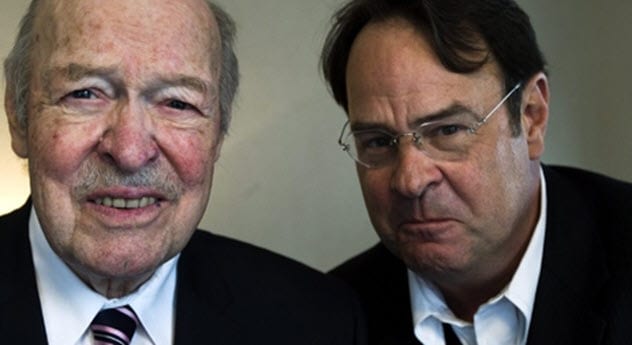
So, where does an idea like Ghostbusters come from?
For Dan Aykroyd, who developed the idea and brought the team together, it came from his own life. Aykroyd’s family was very into spiritualism and the occult when he was growing up. His father and grandfather often held seances at home to communicate with the dead. Also, Dan Aykroyd was once a reserve commander for the Harahan, Louisiana, police department who carried his badge everywhere.
The film idea coalesced into the concept of a comedic paranormal investigation service to catch ghosts. The rest, as they say, is history.
Of all the cast members, Aykroyd still very much believes in and is fascinated by the paranormal. In fact, his dad, Peter Aykroyd, actually wrote the book (or more like “the encyclopedia”) on ghosts in A History of Ghosts. It was published in 2009 when Peter was 87 years old.[12]
10 Warnings And Messages Hidden In Films And TV Shows
About The Author: Jason Stokes is an author and owner of Gestalt Media, an independent publisher. @JSGestalt
